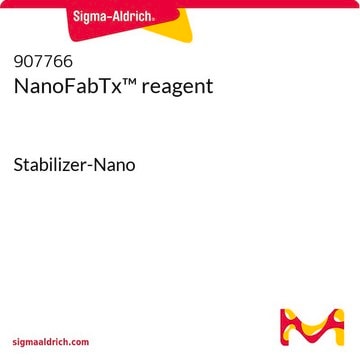917796
NanoFabTx™ PEG-PLGA drug formulation screening kit
for synthesis of PEGylated nanoparticles
Synonyme(s) :
NanoFabTx reagent kit, PEG-PLGA nanoparticles
About This Item
Produits recommandés
Description
Drug loading screening kit, for synthesis of PEGylated PLGA nanoparticles
Kit components :
PEGPLGA-50L(912808-500mg)
PEGPLGA-75L(913049-500mg)
PEGPLGA-50H (915955-500mg)
PEGPLGA-75H (915718-500mg)
Stabilizer-Nano (907766-5g)
Niveau de qualité
Application(s)
advanced drug delivery
Température de stockage
2-8°C
Description générale
- A Nanoprecipitation protocol to prepare drug-encapsulated nanoparticles in standard laboratory glassware.
- A Microfluidics protocol using commercial platforms or syringe pumps.
Application
Caractéristiques et avantages
- Requires minimal laboratory setup
- Optimized protocols with step-by-step instructions for either nanoprecipitation or microfluidics-based synthesis
- Yields specifically sized, low polydispersity biodegradable, PEGylated PLGA nanoparticles from 50 nm to 350 nm in size
- Maximizes the encapsulation of hydrophobic drugs
- Four different PEGylated PLGAs are included
Informations légales
Produit(s) apparenté(s)
Code de la classe de stockage
10 - Combustible liquids
Certificats d'analyse (COA)
Recherchez un Certificats d'analyse (COA) en saisissant le numéro de lot du produit. Les numéros de lot figurent sur l'étiquette du produit après les mots "Lot" ou "Batch".
Déjà en possession de ce produit ?
Retrouvez la documentation relative aux produits que vous avez récemment achetés dans la Bibliothèque de documents.
Articles
NanoFabTx™ platform accelerates drug development with ready-to-use formulations and microfluidic devices for particle synthesis.
NanoFabTX kits enable precise drug delivery with lipid nanoparticles and liposomes for mRNA and nucleic acids.
Professor Robert K. Prud’homme introduces flash nanoprecipitation (FNP) for nanoparticle fabrication, which is a scalable, rapid mixing process for nanoparticle formulations.
Notre équipe de scientifiques dispose d'une expérience dans tous les secteurs de la recherche, notamment en sciences de la vie, science des matériaux, synthèse chimique, chromatographie, analyse et dans de nombreux autres domaines..
Contacter notre Service technique






